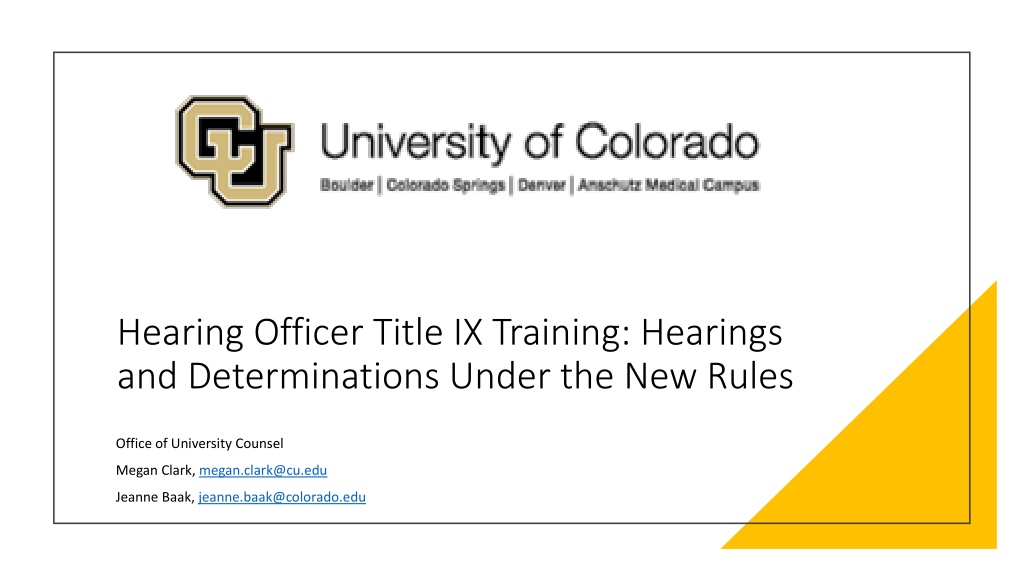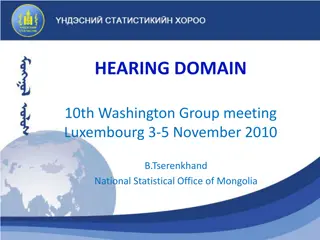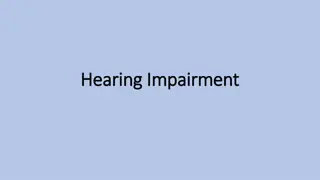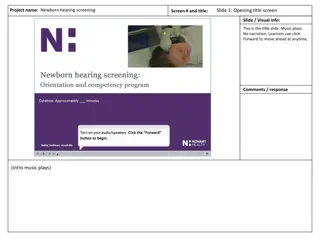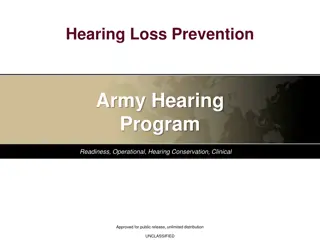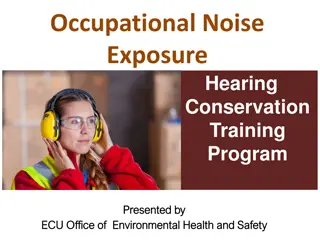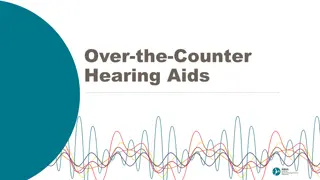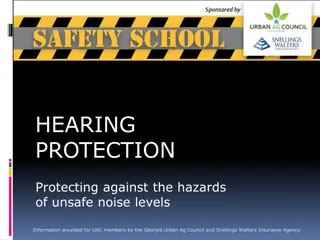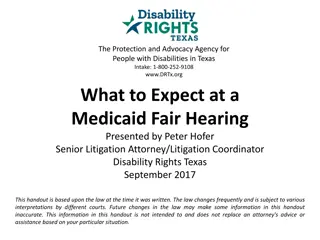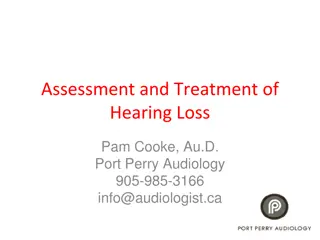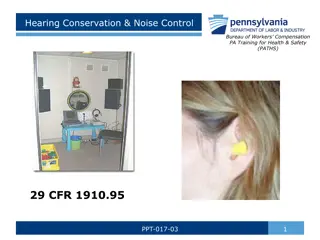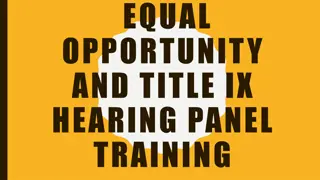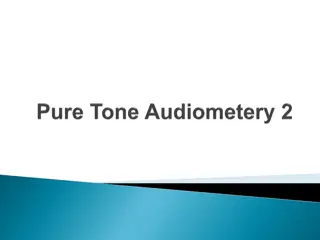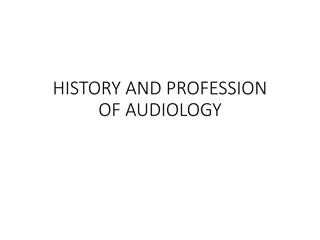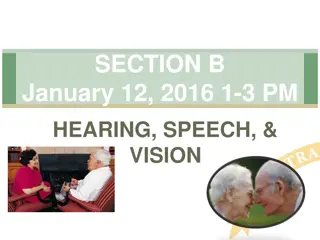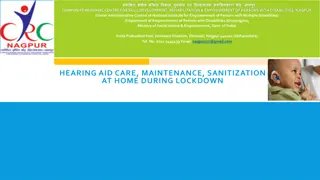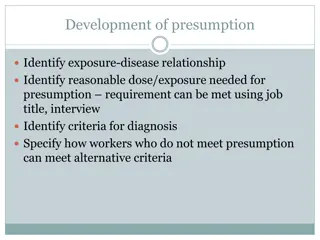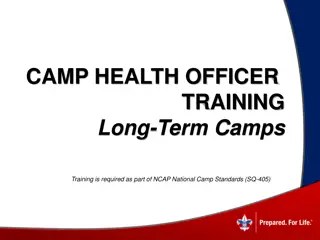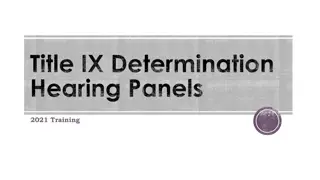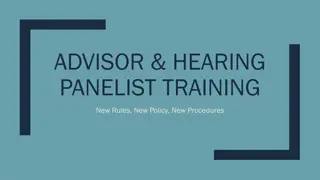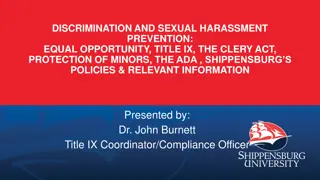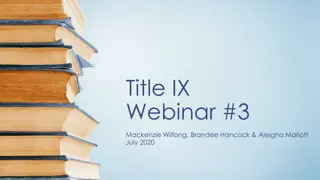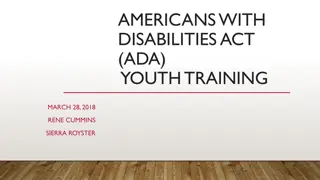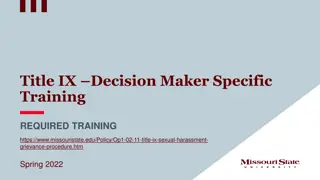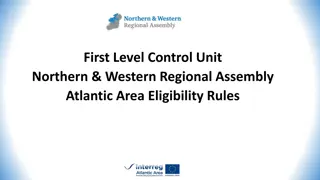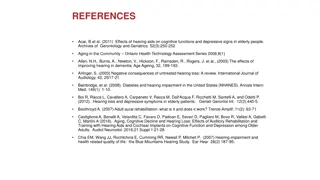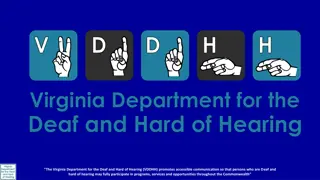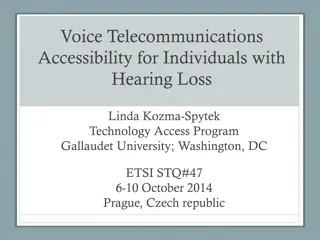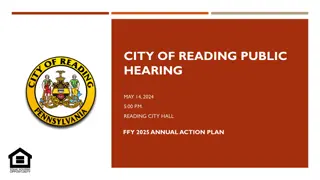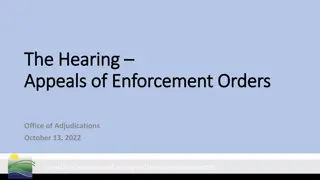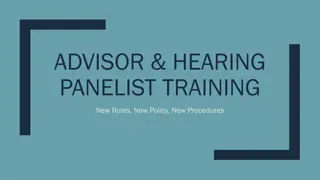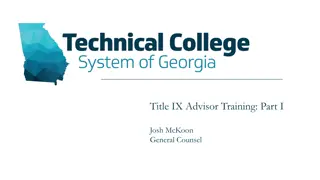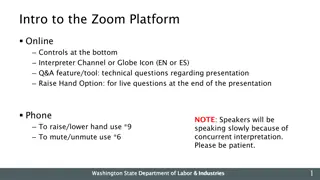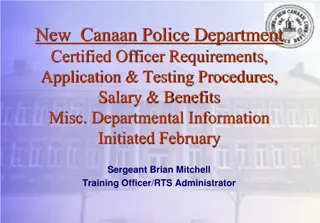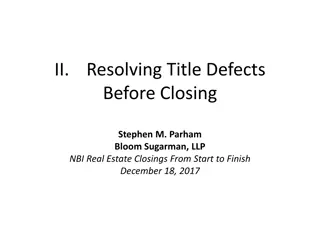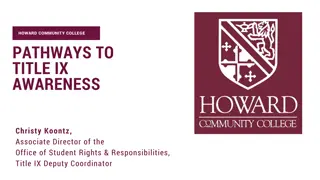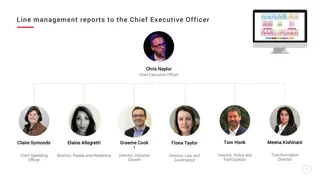Title IX Hearing Officer Training: New Rules & Responsibilities
Comprehensive training covering hearings and determinations under new Title IX rules for Decision-Makers, facilitated by the Office of University Counsel. Topics include required training and contact information for inquiries.
Download Presentation

Please find below an Image/Link to download the presentation.
The content on the website is provided AS IS for your information and personal use only. It may not be sold, licensed, or shared on other websites without obtaining consent from the author. Download presentation by click this link. If you encounter any issues during the download, it is possible that the publisher has removed the file from their server.
E N D
Presentation Transcript
Hearing Officer Title IX Training: Hearings and Determinations Under the New Rules Office of University Counsel Megan Clark, megan.clark@cu.edu Jeanne Baak, jeanne.baak@colorado.edu
What Well Cover Required training for Decision-Makers Under 106.45(b)91)(iii): The definition of Sexual Harassment in 106.30 The scope of CU s education program or activity How to conduct a grievance process (relevant here, a hearing) How to serve impartially by avoiding prejudgment of the facts, conflicts of interest, and bias Issues of relevance (including when questions about a complainant s prior sexual behavior are not relevant) Technology to be used What to expect during the University s hearing process Discussion: How would you handle these scenarios?
106.8 Designation of Title IX Coordinator: The Equity Offices CU Boulder: Office of Institutional Equity and Compliance (OIEC) Valerie Simons, Associate Vice Chancellor and Title IX Coordinator https://www.colorado.edu/oiec/ CU Denver | Anschutz Medical Campus: Office of Equity (OE) Karey Krohnfeldt, Title IX Coordinator https://www1.ucdenver.edu/offices/equity CU Colorado Springs: Office of Institutional Equity (OIE) Laura Emmot, Interim Director of Institutional Equity https://equity.uccs.edu/
Title IX: Scope Title IX: Scope Athletics Recruitment & admissions Financial assistance Discipline Employment Sex-based harassment- why we re here today 20 U.S.C. 1681: No person in the United States shall, on the basis of sex, be excluded from participation in, be denied the benefits of, or be subjected to discrimination under any education program or activity receiving Federal financial assistance.
1972: Statute 1975: Limited Rulemaking Previously: Guidance 1980-1990s: Judicial Decisions 1997-2017: Guidance
Department of Education withdrew the Obama administration s guidance documents Final Rule went into effect 2018-2020: Extensive Rulemaking 2017 14 Aug. 2020 6 May 2020 Final rule released
So, whats new? Title IX Under Obama-Era Guidance Title IX Under the New Rules Flexibility in processes Prescribed grievance process
New Rules Have New Rules Have Substantive Substantive and Changes Changes and Procedural Procedural Notice requirements Training requirements Supportive measures Informal vs. Formal resolutions No single-investigator model A prescriptive grievance process Live hearing and live cross examination Appeal process offered New definitions and terms Emphasis on impartiality Emphasis on protection of constitutional rights Rape shield protections Changes to scope of actionable conduct No gag orders Confidentiality
Standard of proof: CU uses preponderance of the evidence Addressing misconduct that falls outside Title IX s scope Discretionary Areas Adopting rules of procedure and rules of decorum for the hearing process Using virtual hearings
What triggers the Universitys obligations to respond? 106.44(a) When the University has actual knowledge of sexual harassment in an education program or activity of the University against a person in the United States, it must respond promptly in a manner that is not deliberately indifferent.
Actual knowledge 106.30(a) - Actual knowledge means notice of sexual harassment or allegations of sexual harassment to a recipient s Title IX Coordinator or any official of the recipient who has authority to institute corrective measures on behalf of the recipient.
Sexual Harassment Sexual Harassment 106.30: Conduct on the basis of sex that satisfies one or more of the following: Quid Pro QuoSexual Harassment: An employee of the University conditioning the provision of an aid, benefit, or service of the University on an individual s participation in unwelcome sexual conduct; Hostile environment: Unwelcome conduct determined by a reasonable person to be so severe, pervasive, and objectively offensive that it effectively denies a person equal access to the recipient s education program or activity; or Sexual assault as defined in 20 U.S.C. 1092(f)(6)(A)(v), dating violence as defined in 34 U.S.C. 12291(a)(10), domestic violence as defined in 34 U.S.C. 12291(a)(8), or stalking as defined in 34 U.S.C. 12291(a)(30).
Some Examples A professor tells a student she ll give them an A if they ll sleep with her Quid Pro Quo Harassment A student repeatedly sends another student graphic pornography using a University-owned computer Hostile environment A student engages in sexual intercourse with another student, while that student was too intoxicated to consent Sexual assault
In an education program or activity of the University 106.44(a): Education program or activity includes locations, events, or circumstances over which the University exercised substantial control over both the respondent and the context in which the sexual harassment occurs, and also includes any building owned or controlled by a student organization that is officially recognized by the University
Some examples Some examples Education program or activity On campus locations (e.g., dorms, classrooms) On or off-campus university events (e.g., athletic events, music festivals) Activities in buildings controlled by officially recognized student organization (e.g., sororities and some fraternity houses) Actions that use University-controlled technology (e.g., equipment, networks) Circumstances over which the University exercised substantial control over the respondent and the context in which the harassment occurs (e.g., internships) Everything else is not Activities in off-campus, non- University locations (e.g., bars, private housing) Activities in buildings controlled by non-officially recognized organizations (e.g., some fraternities) Personal travel
Against a person in the United States 106.8(d): paragraph (c) of this section apply only to sex discrimination occurring against a person in the United States. Application outside the United States. The requirements of
106.45(b)(3)(i): Mandatory Dismissal Is the conduct sexual harassment as defined in 106.30? Did the conduct occur in an education program or activity of the University? Did the conduct occur within the United States? If the answer to any of those questions is no , the complaint must be dismissed from the Title IX process
Non-Title IX Sexual Misconduct 106.45(b)(3)(i): dismissal of allegations about conduct that does not fall within the definition of Title IX Sexual Misconduct does not preclude the University still taking action under another provision of the its code of conduct
The Two Buckets of Sexual Misconduct The Two Buckets of Sexual Misconduct Other Sexual Misconduct Harassment on the basis of sex that does not meet the definition or jurisdiction of Title IX Sexual Misconduct, but still (1) occurred in an education program or activity of the University; or (2) both complainant and respondent are affiliated with the University; or (3) the University s degree of control over the respondent and the surrounding circumstances led the Title IX coordinator to determine it appropriate to exercise jurisdiction Includes broader concepts like sexual exploitation, as defined in APS 5014 Title IX Sexual Misconduct Harassment on the basis of sex that falls within the Rule s definition and jurisdiction: Conduct that occurs in an education program or activity against a person in the United States.
Why this matters for you Why this matters for you Title IX Sexual Misconduct? Other Sexual Misconduct? Must submit to live cross at the hearing, or prior statements may not be considered. Do not need to apply this rule.
Is it Title IX Sexual Misconduct? Is it Title IX Sexual Misconduct? Nonconsensual sexual contact between two students in an off-campus apartment. NO. Not in the education program or activity. Professor makes lewd comments to student in class on one occasion. NO. Not severe, pervasive, and objectively offensive. Nonconsensual sexual intercourse between two students in a study abroad program. NO. Not in the United States. Nonconsensual sexual intercourse between two students in a dorm room. YES.
A formal complaint A document filed by a complainant or signed by the Title IX Coordinator alleging sexual harassment against a respondent and requesting that the University investigate the allegation of sexual harassment. At the time of filing, a complainant must be participating in or attempting to participate in the education program or activity of the University.
106.8(c): Adoption of Grievance Procedures A recipient must adopt and publish grievance procedures that provide for the prompt and equitable resolution of student and employee complaints alleging any action that would be prohibited by this part and a grievance process that complies with 106.45 for formal complaints as defined in 106.30.
Key Requirements of 106.45 for the formal grievance process: Must treat parties equitably Objective evaluation of all relevant evidence Decision-makers must be impartial Presume that the Respondent is not responsible University bears the burden of proof (preponderance of the evidence) Apply the same burden of proof (preponderance of the evidence) to students and employees Create an investigative report that fairly summarizes relevant evidence Hold a live hearing with live cross examination Allow an advisor or provide an advisor for the hearing Provide for an appeal
The Four Stages of the Universitys Formal Grievance Process Formal Complaint is Filed Hearing and Determination of Responsibility Investigation and Investigative Report Appeal
Requirements of the Live Hearing Cross Examination: each party s advisor asks the other party and any witnesses all relevant questions and follow-up questions directly, orally, and in real time never by a party personally May Be Virtual: CU will use the Zoom platform Advisors: Parties may have an advisor of their choice. If a party does not have an advisor, the University must provide an advisor to conduct cross-examination on behalf of that party. Recorded: University must create a recording or transcript of any live hearing and make it available to the parties for inspection and review.
The Parties Complainant means an individual who is alleged to be the victim of conduct that could constitute sexual harassment Respondent means an individual who has been reported to be the perpetrator of conduct that could constitute sexual harassment
Advisor Each party may have an advisor of his or her own choosing May or may not be an attorney Advisor s role is to conduct cross-examination: directly, orally, and in real time must permit all relevant questions and follow-up questions, including those challenging credibility If a party does not have an advisor, the University must provide an advisor to conduct cross-examination on behalf of that party If a party does not appear and that party s advisor does not appear, a university- provided advisor must still cross-examine any other party or witness who appears
Other Important Roles Title IX Coordinator Investigator Witnesses Support persons
Your role as the Hearing Officer (1) Conduct the hearing Enforce the Rules of Decorum Make relevancy determinations Ask relevant questions (2) Make a Written Determination of Responsibility Findings of fact Conclusions regarding the application of the Policy to the facts A statement of, and rationale for, a determination regarding responsibility
Conducting the Hearing
Impartiality: An Essential Focus From the Preamble: avoid prejudgment of the facts at issue necessitates a broad prohibition on sex stereotypes so that decisions are made on the basis of individualized facts and not on stereotypical notions of what men or women do or do not do. [T]he Department s interest in ensuring impartial Title IX proceedings that Avoid: Pre-judging the facts, conflicts of interest, and bias for/against any party
Rely on stereotypes about how men or women purportedly behave Use data about sexual violence (even if accurate) to consider particular allegations of sexual harassment Draw inferences about credibility based on a party s status as a complainant or respondent As Decision-maker, be influenced by other school officials in reaching a decision I ve seen this before classic frat party case. One drunk girl can ruin a young man s life. Do Not
Follow the Universitys policies and procedures Judge each case on its facts Objectively evaluate the evidence Treat the parties equally Conduct the hearing in manner that does not allow even a perception of bias for or against any party Continue to evaluate bias throughout the process DO:
Technology at the hearing The University s hearings will be conducting using Zoom Know how to control mute settings. Encourage participants to be on mute when not speaking. Know how to record the hearing Understand who will let witnesses in from the waiting room, and who will share the content of a screen to allow for viewing exhibits Encourage participants to turn off computer and phone notifications during the hearing
Preparing for the Hearing Review the investigative report, all relevant evidence, and all directly related evidence Be familiar with the applicable policies and procedures Review whether the matter involves Title IX Sexual Misconduct or other Sexual Misconduct Conduct the pre-hearing conference with the parties and their advisors, where you will: Identify the parties advisors, support person(s), and any witnesses Set the date and time of the hearing Establish the order of parties and witnesses in the hearing Identify exhibits that will be presented Remind parties and advisors of evidentiary rules applicable to their process
Enforcing the Rules of Decorum Although less formal than courtroom proceedings, the University requires a respectful hearing. Any abuse, interference, or failure to comply with university hearing processes could result in the exclusion of individuals from the hearing process or referral to other university offices for resolution. Advisors who violate these expectations after warnings to cease may be asked to leave and may be precluded from attendance at future meetings or hearings. The Hearing Officer has broad discretion and authority to respond to disruptive or harassing behaviors, including adjourning the hearing or excluding disruptive persons.
Relevant Evidence: the only guidepost From DOE: The 106.45 grievance process is designed to bring all relevant evidence concerning sexual harassment allegations to the decision maker s attention so that a determination regarding responsibility is reached fairly and reliably. The Rules of Evidence do not apply, and the University is prohibited from adopting rules that contravene the purposes of the evidentiary requirements under 106.45 (for instance, cannot adopt a rule prohibiting relevant evidence that is unduly prejudicial).
The investigator must collect and make available to the parties for review all relevant and directly related evidence. 106.45(b)(3)(vi) The investigative report and the determination of responsibility may only be based on relevant evidence. 106.45(b)(3)(vi) This must include: the evidence that the University does not intend to rely on in making a determination of responsibility inculpatory or exculpatory evidence, whether obtained from a party or another source
Directly Related Directly Related vs. vs. Relevant Relevant Evidence Evidence Directly related is not defined in the rules. Directly related is a broader universe than relevant. Relevant is not defined in the rules. The Preamble states relevant evidence is: evidence pertinent to proving whether facts material to the allegations under investigation are more or less likely to be true.
Making on-the-spot relevancy rulings Only relevant cross-examination and other questions may be asked of a party or witness. Before a party or witness answers a cross-examination question, the Hearing Officer must first determine whether the question is relevant and explain any decision to exclude it. You may allow the advisors to conduct cross examination without pausing for an affirmative ruling on relevance, only interjecting when there are relevance concerns.
Information protected by a legally recognized privilege Any party s medical, psychological, and similar records unless waived What is NOT NOT Relevant All questions and evidence of a complainant s sexual predisposition All questions and evidence of a complainant s prior sexual behavior, unless offered for 2 exceptions Statements of a party who has not submitted to cross examination
A complainants sexual predisposition: Includes mode of dress, speech, and lifestyle Never relevant, no exceptions Sexual A complainant s prior sexual behavior: Predisposition v. Prior Sexual Behavior Includes activities such as physical conduct like sexual intercourse and sexual contact, or activities that imply physical conduct like use of contraceptives. Also includes behavior of the mind, like fantasies. Not relevant unless offered to show: Someone other than the Respondent committed the conduct alleged Concern specific instances of Complainant s prior behavior with Respondent and are offered to prove consent
Excluding statements of a person who has not submitted to cross examination If a party or witness does not submit to cross-examination at the live hearing, the decision-maker(s) must not rely on any statement of that party or witness in reaching a determination regarding responsibility
Title IX Sexual Misconduct? Other Sexual Misconduct? Must submit to live cross at the hearing, or prior statements may not be considered. Do not need to apply this rule.
Making the Determination
106.45(b)(5): The Investigative Report At least 10 days prior to a hearing the University will send each party the investigative report, for their review and written response. The report must fairly summarize the relevant evidence. You must not defer to the investigative report. The report might, in some circumstances, include a recommendation from the investigator. You must not defer to that recommendation, but make your own conclusions.
106.45(b)(7): Written Determination of Responsibility Decision-maker cannot be the same as the Title IX Coordinator or the investigator(s) Written determination regarding responsibility must: 1. Apply the standard of evidence (Preponderance) 2. Identify the conduct allegedly constituting Sexual Misconduct; 3. Describe the procedural steps taken from the formal complaint through the determination, including notifications to the parties, interviews, methods used to gather other evidence, or hearings held; 4. Findings of fact supporting the determination; 5. Conclusions regarding the application of the Policy to the facts; 6. A statement of, and rationale for, the result as to each allegation, including a determination regarding responsibility
Potential overlap with other laws and processes FERPA: these rules control Title VII Clery Act and VAWA IDEA, Section 504, & ADA HIPAA Criminal law and proceedings
Why is this important? 106.45 Grievance process for formal complaints of sexual harassment. complainant or a respondent in response to a formal complaint of sexual harassment may constitute discrimination on the basis of sex under Title IX. (a) Discrimination on the basis of sex. A recipient s treatment of a
